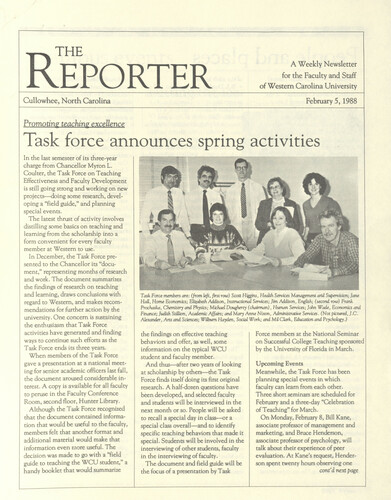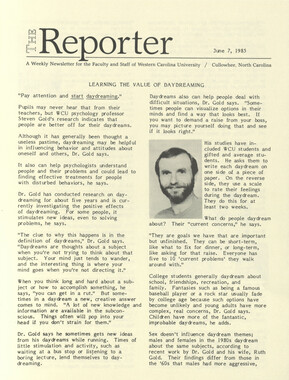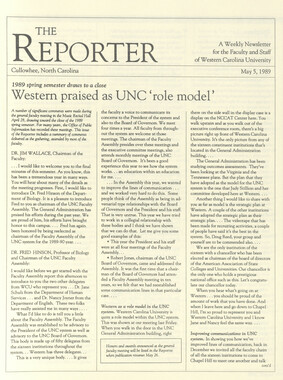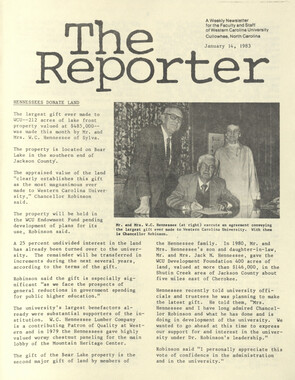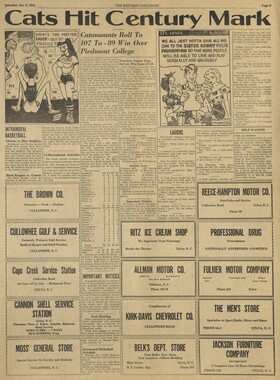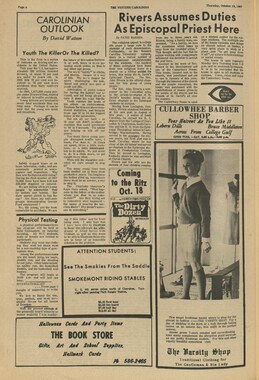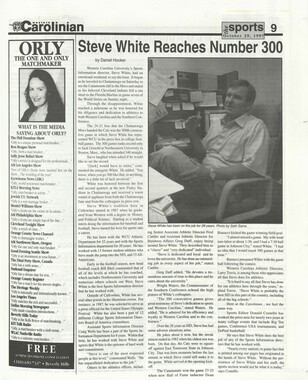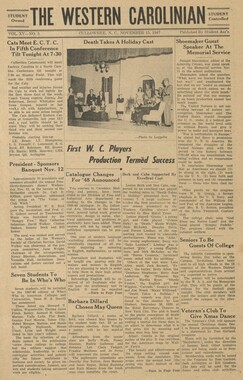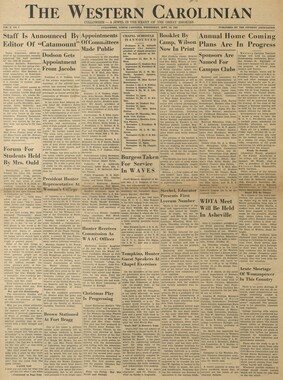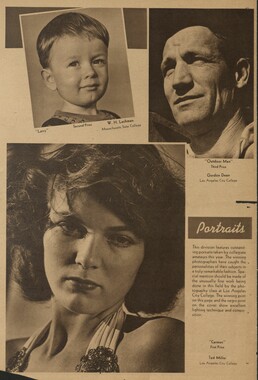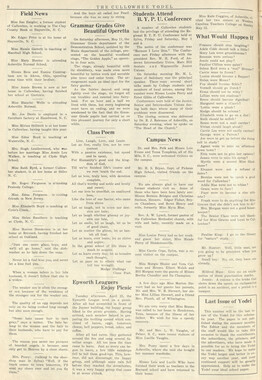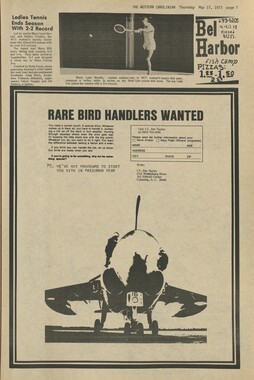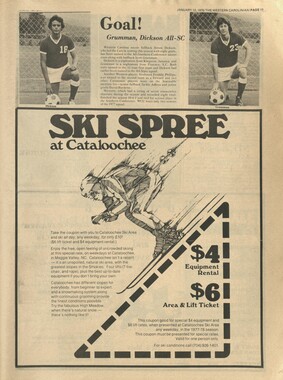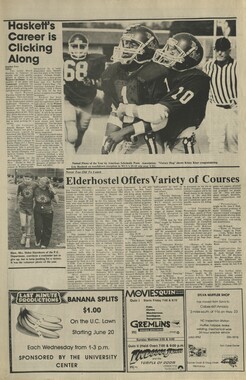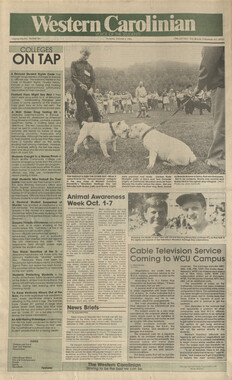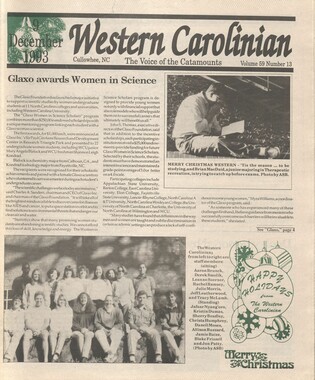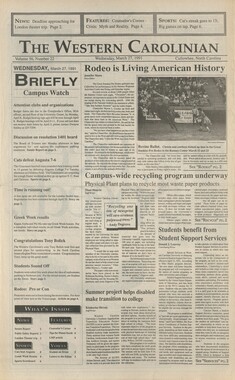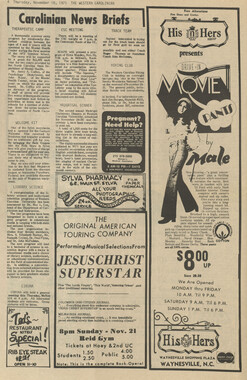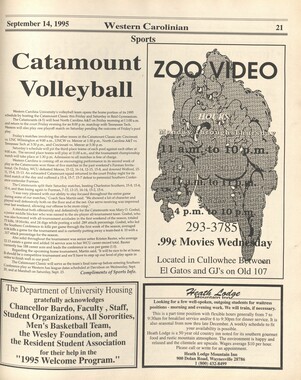Western Carolina University (1)
View all
- Western Carolina University Publications (781)
- Canton Champion Fibre Company (0)
- Cherokee Traditions (0)
- Civil War in Southern Appalachia (0)
- Craft Revival (0)
- Great Smoky Mountains - A Park for America (0)
- Highlights from Western Carolina University (0)
- Horace Kephart (0)
- Journeys Through Jackson (0)
- LGBTQIA+ Archive of Jackson County (0)
- Oral Histories of Western North Carolina (0)
- Picturing Appalachia (0)
- Stories of Mountain Folk (0)
- Travel Western North Carolina (0)
- Western Carolina University Fine Art Museum Vitreograph Collection (0)
- Western Carolina University Herbarium (0)
- Western Carolina University: Making Memories (0)
- Western Carolina University Restricted Electronic Theses and Dissertations (0)
- Western North Carolina Regional Maps (0)
- World War II in Southern Appalachia (0)
University of North Carolina Asheville (0)
View all
- Faces of Asheville (0)
- Forestry in Western North Carolina (0)
- Grove Park Inn Photograph Collection (0)
- Isaiah Rice Photograph Collection (0)
- Morse Family Chimney Rock Park Collection (0)
- Picturing Asheville and Western North Carolina (0)
- Western Carolina University (781)
- Allanstand Cottage Industries (0)
- Appalachian National Park Association (0)
- Bennett, Kelly, 1890-1974 (0)
- Berry, Walter (0)
- Brasstown Carvers (0)
- Cain, Doreyl Ammons (0)
- Carver, George Washington, 1864?-1943 (0)
- Cathey, Joseph, 1803-1874 (0)
- Champion Fibre Company (0)
- Champion Paper and Fibre Company (0)
- Cherokee Indian Fair Association (0)
- Cherokee Language Program (0)
- Crittenden, Lorraine (0)
- Crowe, Amanda (0)
- Edmonston, Thomas Benton, 1842-1907 (0)
- Ensley, A. L. (Abraham Lincoln), 1865-1948 (0)
- Fromer, Irving Rhodes, 1913-1994 (0)
- George Butz (BFS 1907) (0)
- Goodrich, Frances Louisa (0)
- Grant, George Alexander, 1891-1964 (0)
- Heard, Marian Gladys (0)
- Kephart, Calvin, 1883-1969 (0)
- Kephart, Horace, 1862-1931 (0)
- Kephart, Laura, 1862-1954 (0)
- Laney, Gideon Thomas, 1889-1976 (0)
- Masa, George, 1881-1933 (0)
- McElhinney, William Julian, 1896-1953 (0)
- Niggli, Josephina, 1910-1983 (0)
- North Carolina Park Commission (0)
- Osborne, Kezia Stradley (0)
- Owens, Samuel Robert, 1918-1995 (0)
- Penland Weavers and Potters (0)
- Rhodes, Judy (0)
- Roberts, Vivienne (0)
- Roth, Albert, 1890-1974 (0)
- Schenck, Carl Alwin, 1868-1955 (0)
- Sherrill's Photography Studio (0)
- Smith, Edward Clark (0)
- Southern Highland Handicraft Guild (0)
- Southern Highlanders, Inc. (0)
- Stalcup, Jesse Bryson (0)
- Stearns, I. K. (0)
- Thompson, James Edward, 1880-1976 (0)
- United States. Indian Arts and Crafts Board (0)
- USFS (0)
- Vance, Zebulon Baird, 1830-1894 (0)
- Weaver, Zebulon, 1872-1948 (0)
- Western Carolina College (0)
- Western Carolina Teachers College (0)
- Western Carolina University. Mountain Heritage Center (0)
- Whitman, Walt, 1819-1892 (0)
- Wilburn, Hiram Coleman, 1880-1967 (0)
- Williams, Isadora (0)
- 1970s (81)
- 1980s (119)
- 1990s (302)
- 2000s (195)
- 2010s (83)
- 1600s (0)
- 1700s (0)
- 1800s (0)
- 1810s (0)
- 1820s (0)
- 1830s (0)
- 1840s (0)
- 1850s (0)
- 1860s (0)
- 1870s (0)
- 1880s (0)
- 1890s (0)
- 1900s (0)
- 1910s (0)
- 1920s (0)
- 1930s (0)
- 1940s (0)
- 1950s (0)
- 1960s (0)
- 2020s (0)
- Jackson County (N.C.) (780)
- Appalachian Region, Southern (0)
- Asheville (N.C.) (0)
- Avery County (N.C.) (0)
- Blount County (Tenn.) (0)
- Buncombe County (N.C.) (0)
- Cherokee County (N.C.) (0)
- Clay County (N.C.) (0)
- Graham County (N.C.) (0)
- Great Smoky Mountains National Park (N.C. and Tenn.) (0)
- Haywood County (N.C.) (0)
- Henderson County (N.C.) (0)
- Knox County (Tenn.) (0)
- Knoxville (Tenn.) (0)
- Lake Santeetlah (N.C.) (0)
- Macon County (N.C.) (0)
- Madison County (N.C.) (0)
- McDowell County (N.C.) (0)
- Mitchell County (N.C.) (0)
- Polk County (N.C.) (0)
- Qualla Boundary (0)
- Rutherford County (N.C.) (0)
- Swain County (N.C.) (0)
- Transylvania County (N.C.) (0)
- Watauga County (N.C.) (0)
- Waynesville (N.C.) (0)
- Yancey County (N.C.) (0)
- Newsletters (510)
- Publications (documents) (271)
- Aerial Photographs (0)
- Aerial Views (0)
- Albums (books) (0)
- Articles (0)
- Artifacts (object Genre) (0)
- Biography (general Genre) (0)
- Cards (information Artifacts) (0)
- Clippings (information Artifacts) (0)
- Crafts (art Genres) (0)
- Depictions (visual Works) (0)
- Design Drawings (0)
- Drawings (visual Works) (0)
- Envelopes (0)
- Facsimiles (reproductions) (0)
- Fiction (general Genre) (0)
- Financial Records (0)
- Fliers (printed Matter) (0)
- Glass Plate Negatives (0)
- Guidebooks (0)
- Internegatives (0)
- Interviews (0)
- Land Surveys (0)
- Letters (correspondence) (0)
- Manuscripts (documents) (0)
- Maps (documents) (0)
- Memorandums (0)
- Minutes (administrative Records) (0)
- Negatives (photographs) (0)
- Newspapers (0)
- Occupation Currency (0)
- Paintings (visual Works) (0)
- Pen And Ink Drawings (0)
- Periodicals (0)
- Personal Narratives (0)
- Photographs (0)
- Plans (maps) (0)
- Poetry (0)
- Portraits (0)
- Postcards (0)
- Programs (documents) (0)
- Questionnaires (0)
- Scrapbooks (0)
- Sheet Music (0)
- Slides (photographs) (0)
- Sound Recordings (0)
- Specimens (0)
- Speeches (documents) (0)
- Text Messages (0)
- Tintypes (photographs) (0)
- Transcripts (0)
- Video Recordings (physical Artifacts) (0)
- Vitreographs (0)
- The Reporter, Western Carolina University (510)
- WCU Students Newspapers Collection (270)
- A.L. Ensley Collection (0)
- Appalachian Industrial School Records (0)
- Appalachian National Park Association Records (0)
- Axley-Meroney Collection (0)
- Bayard Wootten Photograph Collection (0)
- Bethel Rural Community Organization Collection (0)
- Blumer Collection (0)
- C.W. Slagle Collection (0)
- Canton Area Historical Museum (0)
- Carlos C. Campbell Collection (0)
- Cataloochee History Project (0)
- Cherokee Studies Collection (0)
- Daisy Dame Photograph Album (0)
- Daniel Boone VI Collection (0)
- Doris Ulmann Photograph Collection (0)
- Elizabeth H. Lasley Collection (0)
- Elizabeth Woolworth Szold Fleharty Collection (0)
- Frank Fry Collection (0)
- George Masa Collection (0)
- Gideon Laney Collection (0)
- Hazel Scarborough Collection (0)
- Hiram C. Wilburn Papers (0)
- Historic Photographs Collection (0)
- Horace Kephart Collection (0)
- Humbard Collection (0)
- Hunter and Weaver Families Collection (0)
- I. D. Blumenthal Collection (0)
- Isadora Williams Collection (0)
- Jesse Bryson Stalcup Collection (0)
- Jim Thompson Collection (0)
- John B. Battle Collection (0)
- John C. Campbell Folk School Records (0)
- John Parris Collection (0)
- Judaculla Rock project (0)
- Kelly Bennett Collection (0)
- Love Family Papers (0)
- Major Wiley Parris Civil War Letters (0)
- Map Collection (0)
- McFee-Misemer Civil War Letters (0)
- Mountain Heritage Center Collection (0)
- Norburn - Robertson - Thomson Families Collection (0)
- Pauline Hood Collection (0)
- Pre-Guild Collection (0)
- Qualla Arts and Crafts Mutual Collection (0)
- R.A. Romanes Collection (0)
- Rosser H. Taylor Collection (0)
- Samuel Robert Owens Collection (0)
- Sara Madison Collection (0)
- Sherrill Studio Photo Collection (0)
- Smoky Mountains Hiking Club Collection (0)
- Stories of Mountain Folk - Radio Programs (0)
- Venoy and Elizabeth Reed Collection (0)
- WCU Gender and Sexuality Oral History Project (0)
- WCU Mountain Heritage Center Oral Histories (0)
- WCU Oral History Collection - Mountain People, Mountain Lives (0)
- Western North Carolina Tomorrow Black Oral History Project (0)
- William Williams Stringfield Collection (0)
- Zebulon Weaver Collection (0)
- African Americans (390)
- Appalachian Trail (35)
- Artisans (521)
- Cherokee art (84)
- Cherokee artists -- North Carolina (10)
- Cherokee language (21)
- Cherokee pottery (101)
- Cherokee women (208)
- Church buildings (167)
- Civilian Conservation Corps (U.S.) (110)
- College student newspapers and periodicals (1830)
- Dams (103)
- Dance (1023)
- Education (222)
- Floods (61)
- Folk music (1015)
- Forced removal, 1813-1903 (2)
- Forest conservation (220)
- Forests and forestry (917)
- Gender nonconformity (4)
- Great Smoky Mountains National Park (N.C. and Tenn.) (154)
- Hunting (38)
- Landscape photography (10)
- Logging (103)
- Maps (84)
- Mines and mineral resources (8)
- North Carolina -- Maps (18)
- Paper industry (38)
- Postcards (255)
- Pottery (135)
- Railroad trains (71)
- Rural electrification -- North Carolina, Western (3)
- School integration -- Southern States (2)
- Segregation -- North Carolina, Western (5)
- Slavery (5)
- Sports (452)
- Storytelling (245)
- Waterfalls -- Great Smoky Mountains (N.C. and Tenn.) (66)
- Weaving -- Appalachian Region, Southern (280)
- Wood-carving -- Appalachian Region, Southern (328)
- World War, 1939-1945 (173)
- Text (781)
- MovingImage (0)
- Sound (0)
- StillImage (0)
The Reporter, February 1988
-
The Reporter is a publication produced by Western Carolina University featuring news, events, and campus community updates for faculty and staff. The publication began in August of 1970 and continues digitally today. Click on the link in the “Related Mate
-
-
REPORTER A Weekly Newsletter for the Faculty and Staff of Western Carolina University Cullowhee, North Carolina February 5,1988 Promotirig teaching, excellence Task force announces spring activities In the last semester of its three-year charge from Chancellor Myron L. Coulter, the Task Force on Teaching Effectiveness and Faculty Development is still going strong and working on new projects—doing some research, developing a "field guide," and planning special events. The latest thrust of activity involves distilling some basics on teaching and learning from the scholarship into a form convenient for every faculty member at Western to use. In December, the Task Force presented to the Chancellor its "document," representing months of research and work. The document summarizes the findings of research on teaching and learning, draws conclusions with regard to Western, and makes recommendations for further action by the university. One concern is sustaining the enthusiasm that Task Force activities have generated and finding ways to continue such efforts as the Task Force ends its three years. When members of the Task Force gave a presentation at a national meeting for senior academic officers last fall, the document aroused considerable interest. A copy is available for all faculty to peruse in the Faculty Conference Room, second floor, Hunter Library. Although the Task Force recognized that the document contained information that would be useful to the faculty, members felt that another format and additional material would make that information even more useful. The decision was made to go with a "field guide to teaching the WCU student," a handy booklet that would summarize Task Force members are: (from left, firs t row) Scott Higgins, Health Serv ices Management arid Su pervision; Jane Hall, Home Economics; Elizab eth Addison, Instru ctional Services; Jim Addison, En glish; (second row) Fran k Prochaska, Chemistry and Physics ; Michael Dougherty (chairman), Human Services; John Wade, Economics and Finance; Judith Stillion, Academic Affairs; and Mary Anne N ixon, Administrative Services. (Not pictured, J.C. Alexander, Arts and Sciences; Wilburn Hay den, Social Work; and Mil Clark, Education and Psychology.) the findings on effective teaching behaviors and offer, as well, some information on the typical WCU student and faculty member. And thus—after two years of looking at scholarship by others—the Task Force finds itself doing its first original research. A half-dozen questions have been developed, and selected faculty and students will be interviewed in the next month or so. People will be asked to recall a special day in class—or a special class overall—and to identify specific teaching behaviors that made it special. Students will be involved in the interviewing of other students, faculty in the interviewing of faculty. The document and field guide will be the focus of a presentation by Task Force members at the National Seminar on Successful College Teaching sponsored by the University of Florida in March. Upcoming Events Meanwhile, the Task Force has been planning special events in which faculty can learn from each other. Three short seminars are scheduled for February and a three-day "Celebration of Teaching" for March. On Monday, February 8, Bill Kane, associate professor of management and marketing, and Bruce Henderson, associate professor of psychology, will talk about their experience of peer evaluation. At Kane's request, Henderson spent twenty hours observing one cont'd next page 1 People and places • Duane Davis (Criminal Justice) chaired a session on Excellence in Criminal Justice Curriculum" at the annual Southern Criminal Justice Association meeting in Birmingham, Ala., in October. He also presented a paper entitled Executive Protection: An Emerging Trend in Criminal Justice Education and Training," which has been accepted for publication in The Justice Professional. • James E. Dooley (vice-chancellor for Development and Special Services) has been appointed by the North Carolina Association of Colleges and Universities to serve a three-year term on its Committee on the College Student. The committee conducts a variety of projects, including research on different facets of college life related to students. This year the committee will focus on the effectiveness of adult-learner programs from the perspective of the adult learner. • B.J. Dunlap (Management and Marketing) will serve a one-year term as president of the Association of Graduate Business Directors, a 75- member association of deans and directors of graduate studies at institutions primarily in the Southeast. The organization's purpose is to provide a forum for individuals who lead business graduate schools, so they can keep their business programs current and effective. Dunlap has been secretary, treasurer, and vice-president of the organization. • Glenn Liming spoke at the joint meeting of the American Physical Society and the American Association of Physics Teachers in Washington, D.C., on January 28. His presentation was entitled 'The Choice of Introductory Physics Topics within the Context of the Process Rather than the Content of Physics." • Laura Mann (Music) recently conducted a three-day workshop, sponsored by Tilyou Music Studios of Niagara Fails, N.Y., dealing with different pedagogical approaches in teaching voice to different age groups. Selected participants performed at a master class recital, and Mann presented her own program of vocal works, illustrating the workshop's vocal techniques. Mann was also a soloist at Our Lady of the Rosary Cathedral on Christmas morning in a concert of nineteenth and twentieth century Christmas music. • Kirs ten Underwood (Reading Center) performed a solo cello recital at the Waynesville Public Library on January 24, a program sponsored by the Haywood County Arts Council and the Friends of the Library. The program included works by Brahms, Vivaldi, and Mendelssohn. Task Force cont'd of Kane's classes during the fall semester. He had a list of things Kane wanted him to watch for and the freedom to talk to the students as well as observe. (He now says he got as much out of the experience as his colleague did.) The two professors will hold forth beginning at 3 p.m. in the Faculty Conference Room. Refreshments will be served. On Friday, February 19, Jo Ann Carland, assistant professor of accounting and information systems, will give a Sandwich Seminar on "Cognitive Styles as Described by the Myers-Briggs Type Indicator." The seminar will begin at 12 noon and the presentation will last about forty-five minutes. After the presentation, participants who can stay a little longer will be able to determine their own "types," which are based on Jungian psychology. Andy LaTorre will present a second Sandwich Seminar on Tuesday, February 23, beginning at 12 noon. His topic will be "Creativity." In an experiential presentation, he will demonstrate ways to move from conveying information to stimulating the higher levels of learning described in Bloom's taxonomy. This seminar will continue until 1:30 p.m. All faculty are invited to bring a lunch to the Sandwich Seminars and enjoy the collegial interchange in the Faculty Conference Room. Coffee and tea will be prQvided. The "Celebration of Teaching" will begin Monday, March 21, with a presentation by Joseph Lowman of the Chapel Hill psychology faculty. Lowman, whose research on characteristics of distinguished teachers has recendy appeared in a book, will speak on "Emulating the Expert Teacher" at 3 p.m. in the Ramsey Center's Hospitality Room. A reception will follow. Other celebration events will include Teaching Tips luncheons and a poster session on teaching strategies and techniques. Look for more information in the March Task Force Newsletter. Plans for Teaching Effectiveness seminars like those held the past two years in May are incomplete, pending more information about available funds. In January the Task Force held a reunion and reception for past participants and their deans and department heads. The overflow crowd heard new faculty discuss the benefits they derived from a special seminar during the 1987 spring break; participants in the May seminar told about the progress they were making on their action plans, and honors faculty discussed their conclusions on the direction of the honors program. Michael Dougherty, chairman of the Task Force, says, "The Task Force has reached and influenced a large proportion of the faculty. It's great to see faculty from the various disciplines talking with one another about their teaching. Even though the Task Force will finish its work at the end of this semester, its momentum will take other forms and continue to be a positive influence on teaching effectiveness at Western Carolina University." - Elizabeth Addison Instructional Services Office February5, 1988 The Reporter Campus events PIANO RECITAL- Asheville pianist DeWitt Tipton will present a program of solo works in a recital Tuesday, February 9, at 8 p.m. in the Music-English Recital Hall. The program will include works by Chopin and Ravel. Tipton, a graduate of the University of Illinois, is a member of the music faculty at UNC-A. He has performed widely throughout the Southeast as pianist and conductor. The concert is free and open to the public. VIDEOCONFERENCE - A special videoconference for teachers on positive approaches to discipline will be held from 5-8:30 p.m. on Tuesday, February 9, in the Cherokee Room of the University Center. There is no admission charge. Western will be one of an expected thirty-five to forty sites in the U.S. participating in the satellite-transmitted videoconference which features Charles Wolfgang, co-author of the recent Solving Discipline Problems: Strategies for Classroom Teachers. The program is co-sponsored by the School of Education and Psychology, the Office of Continuing Education and Summer School, the University Media Center, and Jackson County Schools. It originates from the University of Georgia's Center for Continuing Education. Hitting the ice As temperatures go down, Ramsey Center's rink heats up It's 7:00 on a Thursday night and the ice skating rink is about to open. Already a long line has formed at the skate rental table where students Mike Hanes of Lexington and Jack Gimple of Morganton are filling orders. Within twenty minutes, the most popular sizes (ladies' eight, men's nine) are all rented. By 7:30 p.m., there are a hundred skaters on the ice. Hayes thinks it's a slow night. "Fridays and Saturdays we have close to 200, " he says. Since the rink opened for its second season last month, skaters of all ages—tots and teenagers to couples and senior citizens—from the local community and neighboring towns have hit the ice, so to speak. They spin and glide or trip and skid before dozens of spectators watching from outside the rink or from a steady procession of cars that pass by. After a disappointing first season plagued by weather and equipment woes, the ice rink made a spectacular comeback this year, thanks to suitable cold temperatures Sarah Kucharski, 7, daughter of Rich ard (Legal Counsel) and Glenda Kucharski, takes a spin on the ice with Kirk Nelson, an instructor at the Rams ey Center rink. Skating lessons were offered by the Jackson County Recreation and Parks Departmen t. Faculty publications Paradis, Philip. "A Conversation with Brendan Galvin" (interview). Tar River Poetry 27 ( 1987): 1-12. . "William Towbridge's The Book of Kong" (review). Prairie Schooner 61 (Summer 1987): 121-123. . "Lesson for the Day." Kansas Quarterly 19 (1987): 317. . "What the Citizenry Knows." The Laurel Review 21 (Summ er 1987): 29-30. . 'Tremor." The Three Rivers Poetry Journal 29/30 (1987): 52. , "Pickerel." Pembroke 19 (1987): 154. and the talents of an experienced ice maintenance staff, according to Robert Stewart, Ramsey Center director. For the rink maintenance staff, Stewart chose several students who grew up in the lake regions up North and are accomplished skaters. Health experts say ice skating is an excellent form of recreation for all ages. IF YOU'RE GOING - Only four weeks left. The rink is open to the public nightly from 7-10 p.m. until March. For information about rink availability for special groups, call the Ramsey Center at 227-7677. Rental skates are $1 a pair. Tip: Lace your skates as tightly as possible at the ankle, more loosely near the top, leaving enough room to slip a finger through. The Reporter February 5, 1988 In China arid Thailand Far East trip focuses on economics, education Six members of the board of trustrees and a member of The University of North Carolina Board of Governors , along with three WCU administrators, will return on Sunday, February 7, from China and Thailand. The group made the trip for a first-hand look at Western's programs there. Chancellor Myron L. Coulter and Mrs. Coulter are leading the delegation, invited by officials of Yunnan University and the Yunnan Provincial Government in China and the Ministry of Education in Thailand. Making the fourteen-day trip are trustees Wallace N. Hyde, chairman of NCCAT seminar topics range from quilting to coastlines The North Carolina Center for the Advancement of Teaching (NCCAT) has announced seminar dates and topics for summer and fall 1988. Seminar subjects include music, quilting, North Carolina artists, the Cherokee Indian nation, the Appalachian Mountains, history and development of the North Carolina coast, and a variety of others. Kay S. Shapiro, director of teaching services at the center, said schedules have been mailed to regional education centers, superintendents, principals, school media specialists, alumni, and others throughout the state. Applications for the seminars are now being accepted. Cutoff date is March 1. In addition to regular seminars, special sessions are scheduled for teacher/scholars in residence during June, July, and August, and during one week in November. NCCAT seminars are open to outstanding public school teachers of all grade levels and disciplines. Seminar dates and topics are: The Power of Ideas: A Socratic Teaching Demonstration, July 5-9; The Natural History of North Carolina, June 19-July 3; The Pursuit of Happiness, July 12-16; Escaping the Shadows: Mexicans' Quest for Identity and Survival, July 26-30; A Moment in Time: Exploring the Work of North Carolina Artists, August 1-6; The Nature of the Beast: Defining Public Education in America, August 7-13; Time and Remembrance, August 8-12; A Quilt in Time, September 12- 17; The Cherokee Nation: Beyond the Trail of Tears, September 19-23; Freeing the Inner Voice: A Musical Exploration, September 26-30. Our Founding Faiths: A Paideia Seminar, October 10-14; Graveyard of the Atlantic: Exploring the History, Development, and Future of North Carolina's Coastal Ecology, October 11-15; The Blue Ridge Experience: Human Occupation of Ancient Mountains, October 18-24; Bridging Culture, October 25-29; The Changing Family, November 6-8; Japan: Modern Miracle of the Far East, November 8-12; Oil, Islam, and the Middle East, November 28-December 2; The Power of Metaphor: Education as Story, December 6-10; Leadership, Creativity, and Change, December 12- 17. Applications are available from the center. For additional information about the seminars or about qualifications for applicants, contact Shapiro at 227-7370. NCCAT is located in Madison Hall. A unit of The University of North Carolina, it conducts a year-round program of seminars for the state's outstanding public school teachers. the WCU board, John Q. Schell, Jr., and Stephen W. Woody, all of Asheville; James Cooper of Cherokee; Orville Coward of Sylva; and Deborah Strum of Franklin. Sylva attorney R. Phillip Haire was named by the Board of Governors to represent it on the trip. Others in the party include Anthony A. Hickey, dean of research and graduate studies, and Ellerd Hulbert, director of international instructional programs. During the trip the delegation was to meet with Chinese and Thai officials to discuss economic and education programs established during the last six years with Western. The group was scheduled to visit an agribusiness project and management college in Guangzhou (formerly Canton), where Western has been working for the last year to develop trade and education ties. The group also planned to visit Yunnan University, with which Western has had administrative and faculty exchanges in biology, English, mathematics, and business for six years. In Bangkok, the WCU group was to have discussed with Thai education officials, and possibly officials from the U.S. Agency for International Development and U.S. Information Agency, an ongoing project to convert thirty-six teachers colleges to four-year comprehensive institutions. The Thai colleges need some 800 faculty members upgraded with master's degrees or doctorates. Before his departure, Coulter said Western would propose that a relatively small number come to WCU and other UNC-system institutions to earn the advanced degrees. They would become the faculty at two graduate centers in Thailand that would be established to upgrade the other institutions. Some trustees were accompanied on the trip by their wives, but Hulbert, who coordinated the trip, said the trustees, their wives, and Mrs. Coulter are not traveling at university expense. The Reporter is published by the Offic e of Public Informa tion. February 5, 1988 The Reporter REPORTER A Weekly Newsletter for the Faculty and Staff of Western Carolina University Cullowhee, North Carolina February 12,1988 Dynamic classes mark growing honors program "I do not know where you got that answer," says a young lady to Joe Klerlein, professor of mathematics, in his honors math class. Isomorphic figures are the topic at hand, and Klerlein has just drawn the solution to one of last night's homework problems. The student's comment leads to a vote among the students on whether or not Klerlein's answer is correct (it is). Eager and animated, the class is clearly more than interested in the subject and in each other's ideas. In an honors class, this is not an unusual day. Established in the mid-1970s, the university honors program is designed for the student who discovers there's a genuine delight in learning new things, according to program director Karl Nicholas. "Learning is fun and worth doing in and of itself, and that's the attitude we want to foster," he says. Entering freshmen qualify for invitation to the program by showing a combined score of 1150 on the Scholastic Aptitude Test (or 600 on either the verbal or math section) or by placing in the top ten percent of their high school graduating class. Other freshmen who have a quality point ratio (QPR) of 3.5 or better during the fall semester are also invited to join. Honors students must maintain a QPR of 3.0. Now with a full-time enrollment of eighty-nine students, five new faculty additions, and five new general education courses in its curriculum, the honors program is on the move. "More things covered in more depth—that's my goal for an honors class," says Joe Meigs, associate professor of English, who teaches an honors Joe Klerlein, professor of mathematics, explains his solutio n to a mathematical concepts problem to h is Math 101 honors class. Klerl ein is one of twelve perm anent members of th e honors facult y at Western serving eighty-nine full-time honors students. course in literary landmarks. "I want more participation from the students. I ask for more presentations. I want the class to get to know each other." Apparently that aim is at work throughout the program. Honors students are encouraged to challenge their professors and each other in the classroom, a fact contributing to the program's continuing growth. "They just don't spoon-feed you in these classes," says a student in Meigs's class. "You're given an idea and you go research it. You learn it that way." Another large portion of the program's attraction for students, according to Nicholas, is that it offers "a place to hang out together, as well as socials and speakers and the pleasure of each other's company." Honors faculty members agree that as a unit an honors class assumes a larger, more intense personality. In Nicholas's colorful description, the students' energetic curiosities "strike sparks" against each other. Nicholas says several ideas are in the works for the future of the honors program. There are plans to develop team-taught "general-education-type courses," incorporating material from more than one discipline. An intensive Western civilization course, for example, might combine history with other humanities. Each course would span at least two semesters and would earn participants nine to twelve hours of credit. In addition, Nicholas says, university officials are looking into the possibility of establishing a "living/learning cont'd page 3 People and places • Bill Anderson (History) was recently appointed to the editorial board of the Journal of Cherokee Studies and the advisory board of the Museum of the Cherokee Indian in Cherokee. He also received one of thirty stipends awarded by the Newberry Library of Chicago to attend a recent conference there. Anderson and his wife, Nina, are the authors of Southern Treasures, a book about buried and lost treasures in the southern U.S. as well as natural treasures such as gold, rubies, and sapphires in western North Carolina. • Gurney Chambers (Dean, Educa-tion and Psychology) made three presentations to teachers and administrators in the Virginia Beach City Schools on January 29. • John K. Creech began work at Hunter Library on February 1 as a reference librarian. He comes to Western from Durham, where he was a reference librarian at Duke University. A native of Raleigh, he lived in northern Idaho from 1977-1981, building homes and working with the U.S. Forest Service as a fire lookout/ firefighter. Creech received the B.A. in English and the M.S. in Library Science from UNC-Chapel Hill. • Robert Dalley (Industrial Education and Technology) presented a paper entitled "The Right to Know Standard" at the American Vocational Association's annual convention in Las Vegas, Nev., on December 5. • Gordon Mercer (Political Science, Public Affairs, and Sociology) has been named chairman of the North Carolina Political Science Association teaching committee. The committee has members from six different colleges and universities in the state. Its purpose is to find ways to stimulate excellence in the teaching of political science. • Arlene C. Stewart (Learning Disabilities Training Project) attended the project directors' third annual meeting sponsored by the Secondary Transition Institute at the University of Illinois and held in Washington, D.C., on December 10-11. She also attended a technical assistance workshop in Washington on December 9. The Learning Disabilities Training Project here is one of thirty-eight postsecon-dary transition projects around the country providing information and support to students with specific News briefs Library offers tax help Hunter Library offers numerous resources for completing 1987 state and federal income tax returns. A handbook entitled Reproducible Federal Tax Forms for Use in Libraries, available at the reference desk, contains instructions and forms which may be photocopied and mailed in with federal returns. The library has helpful tax information publications that give additional detailed information for various forms and lists of toll free phone numbers to call for information. Tax guides from private publishers to advise in filling out federal returns are also available. In addition, at the library's request, the State Department of Revenue has sent a wide selection of state tax forms, which are available to faculty and staff. For additional information, call the library at 227-7307. STAR van trips scheduled Several STAR van trips to Clemson University, the University of Georgia, and the University of Tennessee at Knoxville remain scheduled for the spring semester. The list includes trips to the University of Tennessee on Monday, March 7 and 14, and Tuesday, April 12; the University of Georgia on Tuesday, March 1, and Wednesday, March 9 and 23; and Clemson University on Wednesday, February 24; learning disabilities and to the institutions where they are enrolled. • James W. Wallace (Biology) appeared as a guest lecturer for the Tryon Photographic Society on January 26. His topic was "A Photomacrogra-phic Approach to the Wild Flowers of the Southern Appalachians." Thursday, March 3; Friday, March 18; Monday, April 18; and Thursday, April 21. The van leaves at 8 a.m. and returns at about 8 p.m. To reserve seats for specific dates or for additional information, contact Jeanne Nienhuis at 227- 7398. Nominations open for Paul A. Reid awards Nominations for the 1988 Paul A. Reid Distinguished Service Awards are now being accepted, according to selection committee Chairman Becky Kornegay. Nominations may be made by faculty, administration, staff, students, trustees, and alumni of the university. The yearly awards are presented to a faculty member and an administrative staff member, along with a $ 1,000 cash award. Nominees are evaluated on "the extent of quality of service that contributes to the general welfare of Western Carolina University and enhances its reputation as a regional institution of higher education," according to endowment provisions. A recipient is not eligible for the award more than once in five years. Information on how to prepare nominations is available from Kornegay in Hunter Library, telephone 227-7274. Nominations should also be sent to Kornegay. Deadline for receipt of nomination forms is Thursday, February 25. February 12, 1988 The Reporter Campus eve nts BLACK HISTORY PROGRAM - Western North Carolina Tomorrow (WNCT) and the Organization of Ebony Students will present a program entitled "Perspectives and Permanence: Preserving a Culture Before It Is Lost" at 7:30 p.m. on Monday, February 22, in the Mountain Heritage Center. A part of Western's observance of Black History Month, the program will feature a photographic exhibit by WNCT and a slide show entitled "Blacks in Jackson County" by Swain County public school teacher Victoria Casey McDonald. A reception will follow. For additional information, contact Gwen Sheppard at WNCT in the Center for Improving Mountain Living, telephone 227-7492. AUDITIONS - Parts are available for three men and two women in the speech and theatre arts department production of Foxfire, to be directed by Steve Ayers. Auditions will be held Monday, February 22, at 7 p.m. in the Niggli Theatre. Those auditioning should bring a prepared monologue and a picture/resume. Those auditioning for the part of the singer Dillard will need to sing "Dear Lord" and "Red Ear" and accompany themselves on the guitar. Show music is available in the director's office, Stillwell 125. Rehearsals begin Monday, March 14, with all lines learned, and the show runs Tuesday- Sunday, April 12-17, and Wednesday- Saturday, April 20-23. For more information, contact the speech and theatre arts department at 227-7491. BAKE SALE - The WCU chapter of the North Carolina Association of Educational Office Personnel (NCAEOP) is sponsoring bake sales, lunches, and other events at various locations on campus during the month of February. Proceeds support yearly scholarships for WCU students. The offices of McKee Building will hold an NCAEOP bake sale in the building's lobby from 8:30 a.m.- noon on Friday, February 12, in honor of Valentine's Day. Be sure to check in your own building for other NCAEOP events. Recipes are still being solicited for the university-wide NCAEOP cookbook to be published this spring. Proceeds from sale of the book will be used to contribute to NCAEOP's annual Christmas project. Each recipe, along with the name of the person submitting it, should be typed or printed legibly on a 3" x 5" or 4" x 6" note card. Ingredients and preparation steps should be checked for accuracy. All recipes should be sent to Sylvia DuPree in Parks and Recreation Management in McKee 109 no later than Monday, February 29. Any questions about the project can be directed to DuPree at 227-7435. JUST A REMINDER - Dates have been changed for the operetta Naughty Marietta. New dates for the show are Wednesday-Saturday, February 17-20 and 24-27, at 7:30 p.m. in Niggli Theatre. A matinee performance will be offered on Sunday, February 21, at 2 p.m. Tickets are $8 for adults, $5 for others. For more information, contact the speech and theatre arts department at 227-7491. Honors cont'd center" with living and classroom/computer facilities for honors students. Nicholas adds that he would like to include "an overseas dimension of some sort" in the program. The honors faculty hopes to continue to widen the program's appeal with a new emphasis on the option for part-time honors study. Eligible students may enroll in individual seminars without pursuing the entire honors program, or they may choose to complete twelve hours of honors credit during their career at WCU in order to receive the "honors associate," Nicholas says. In their first two years of college study, full-time honors students take eighteen hours of general education courses; in the final two years, they complete twelve upper division credits. The program's usual upper division offerings come in two types: interdisciplinary colloquia and seminars, which are not administered by specific departments, and departmental courses, which are. Instructors in upper division honors courses are considered adjunct rather than permanent honors faculty. New courses and new general education faculty are added to the honors curriculum upon approval by a committee of honors faculty and students, which considers new proposals each spring. The committee received over twenty proposals from faculty this year. The five new permanent honors faculty to be teaching in the fall semester are Richard Berne (Physics 110H), Glenn Erickson (Philosophy 101H), Harold Herzog (Psychology 101H), Henry Mainwaring (Biology 101H), and Ronald Morgan (German 110H). These instructors join current honors faculty Jim Addison (English), Steve Ayers (Speech and Theatre Arts), Nancy Joyner (English), Klerlein (Math), Meigs (English), Nicholas (English), and Terry Nienhuis (English). Adjunct honors faculty for 1988-89 are James Byer (English), Mike Jones (Philosophy and Religion), Cliff Lovin (Dean, Arts and Sciences), Gerry Schwartz (History), and Max Williams (History). For additional information about next year's honors course offerings, contact Nicholas at 227-7383. - Joseph Price The Reporter February 12, 1988 THE WEEK AT WCU - FEBRUARY 15 -21 Monday, February 15 10 a.m.-lO p.m. Video: Pee Wee Herman's Big Adventure, second floor, University Center, free. 6-9 p.m. Annual Phonathon 7:30 p.m. Reception for Folk Art exhibition by Clyde Whiteside, Belk Art Gallery. 7:30 p.m. Basketball vs. East Tennessee State, Johnson City, Tenn. Tuesday, February 16 8 a.m. STAR van leaves Forsyth parking lot for UT-Knoxville Noon Roundtable discussion on substance abuse, Dodson Cafeteria. 8 p.m. Pianist Warren Gaughan, Music-English Recital Hall, free. Wednesday, February 17 6 p.m. Drug Awareness Week featured speaker: Dean Biasucci, placekicker for the Indianapolis Colts, Music-English Recital Hall. 7:30 p.m. Operetta: Naughty Marietta, Niggli Theatre, Exhibits February 12, 1988 $8 adults, $5 others. 730 p.m. Women's basketball at UT-Chattanooga. Thursday, February 18 330 and 7 p.m. Movie: A Face in the Crowd, with Walter Matthau, Jackson County Library, free. 7:30 p.m. Operetta: Naughty Marietta, Niggli Theatre, $8 adults, $5 others. Friday, February 19 Deadline for receipt of proposals by Graduate School for Faculty Research Grants and for Graduate School Research Assistantships. Friday Night Skiing, pre-register University Center, $18 WCU students, $23 others. Noon Sandwich Seminar: "Cognitive Syles as Described by the Myers-Briggs Type Indicator," with Jo Ann Carland, Faculty Conference Room, Library. 2 p.m. Baseball at UNC Charlotte. 7 and 9:30 p.m. Movie: The Secret of My Success, Cherokee Room, University Center, $1 WCU students, $1.50 others. The Reporter is published by the O ffice of Public Information. 7:30 p.m. Operetta: Naughty Marietta, Niggli Theatre, $8 adults, $5 others. Saturday, February 20 Overnight Caving Trip, pre-register University Center, $20 WCU students, $23 others. 9 a.m.-4 p.m. Non-credit course: "How to Start a Home- Based Business," 223 Natural Sciences Building, $45 registration fee. 9:30 a.m. Women's tennis vs. Oglethorpe, Atlanta, Ga. Noon Drug Awareness luncheon, Ramsey Center Hospitality Room, $7. 1 p.m. Baseball atN.C. State, double header. 2 p.m. Women's tennis vs. Georgia State, Atlanta. 3 p.m. Kicking exhibition featuring Indianapolis Colts placekicker Dean Biasucci and WCU senior Kirk Roach, Whitmire Stadium. 5 p.m. Women's basketball vs. Marshall, Ramsey Center. 7:30 p.m. Basketball vs. The Citadel, Ramsey Center. 7:30 p.m. Operetta: Naughty Marietta, Niggli Theatre, $8 adults, $5 others. Sunday, February 21 1 p.m. Baseball atN.C. State, doubleheader. 2 p.m. Movie: The Secret of My Success, Cherokee Room, University Center, $1 WCU students ,$1.50 others. 2 p.m. Operetta: Naughty Marietta, Niggli Theatre, $8 adults, $5 others. The Reporter "Jackson: A Mountain County," an historical exhibit, and "Working on a Building: Jackson County Churches," a photography exhibit, 8 a.m.-5 p.m., Mountain Heritage Center, through spring. "Coverlets: New Threads in Old Patterns," a nine-projector slide show, Mountain Heritage Center, 8 a.m.-5 p.m., through summer. "Migration of the Scotch-Irish People," 8 a.m.-5 p.m., Mountain Heritage Center, a permanent exhibit. Folk Art by Clyde Whiteside, Art Gallery, Belk Building, February 15-April 1. T>v THE REPORTER A Weekly Newsletter for the Faculty and Staff of Western Carolina University Cullowhee, North Carolina February 19,1988 Aggressiveness and self-defense Snakes show individual personalities, professor says Do snakes have personalities? They do when it comes to defending themselves against threats or predators, says Harold Herzog, associate professor of psychology. From the moment of birth, each snake knows its enemies and whether it will strike or flee. The response is innate, Herzog says, and their differences in aggressiveness indicate individuality. "It's as if they have different per-sonalities," he says. "I think I can legitimately say that." Herzog has been studying the defensive behavior of snakes for three years. He has been interested in the field of ethology, the study of animal behavior, since his undergraduate days at the American University of Beirut, and he earned master's and doctoral degrees in experimental psychology at the University of Tennessee. He joined the WCU faculty this year after teaching at Mars Hill College and the University of Tennessee. His research in animal behavior has taken him to Florida, Panama, and throughout the South to study alligators, crocodiles, snakes, lizards, bats, and gamecocks. His doctoral dissertation was on cockfighting, specifically how cocks use immobility response (playing dead). But Herzog says he wound up being more interested in the people who raise gamecocks and who attend cockfights. Herzog now studies snakes because they are precocial creatures—they don't require parental care for development and are fully capable of a variety of complex behaviors at birth. He maintains there are vast behavioral differences among snake species, snakes of the same species, and even individual snakes in the same litter, and he wants to know why. Harold Herzog, left, and psych ology major Kevin Rexr oad use the standardized test dev eloped by Herzog to measure the aggressiveness of three spe cies of garter s nakes. A $28,000 National Science Foundation grant to study three species of garter snakes will help further document these differences and find answers. Herzog has developed a standardized test to measure defensive behaviors of thirty snakes he uses in his research on campus. He lets one loose in a carpeted box for thirty seconds and presents it with a "threat," his finger or a small model of an animal, and counts the number of times the snake strikes, bites, and reacts with defensive tongue flicks, or whether it flees. "I've been bitten thousands of times," he admits. Herzog and psychology major Kevin Rexroad are working with the common garter snake (Thamnophis sirtalis), a Midwestern species (Thamnophis butleri), and a Mexican species (Thamnophis mehnogaster). He has about 200 more snakes at the University of Tennessee, where he is an adjunct professor and conducts similar research with colleagues. "All three species are different," Herzog says. "The Mexican species is generally aggressive, and the Midwestern species is very passive." Herzog is looking at which stimuli are most effective in eliciting defensive reactions, the human hand or model of an animal; whether snakes raised in isolation are more or less aggressive; and whether he can change a snake's behavior by changing its "experiences." Herzog finds that a baby snake's strikes deter some animals, such as kittens, but not others, such as ferrets. Snakes generally are more aggressive when full, he says, perhaps because they are too heavy to flee rapidly. When fed a worm "the equivalent of a man eating a seventy-pound hamburger," they strike more often than they flee. He believes that snakes habituate or "learn" how to react defensively and is writing a paper on the topic. He already cont'd next page News briefs Regional baalnl'dS tate meets on campus About 350 young musicians from fourteen western counties, selected by audition, assembled on campus February 12 and 13 for the Western North Carolina Regional All-State Band. The students, from Buncombe, Cherokee, Clay, Graham, Haywood, Henderson, Jackson, Macon, Madison, Mitchell, Polk, Rutherford, Transylvania, and Yancey counties, ranged from junior high through high school age. They divided into four bands for intensive rehearsals with prominent guest conductors, leading up to a final concert in the Ramsey Activity Center. The regional all-state activity was sponsored by the Western District Band Directors Association and hosted by the WCU music department. Top chairs in the Senior High Symphonic Band during the all-state band at Western are eligible to audition on Saturday, March 12, for the statewide North Carolina Honors Band that will assemble at North Carolina State University in April. Nominations open for 1988 teaching award The Chancellor's Distinguished Teaching Award Committee, chaired by Maynard Adams (Industrial Educa-tionand Technology) seeks nominations for the 1988 award. The winner will receive a plaque and a $1,000 cash award, and a Patrons of Quality scholarship will be awarded in honor of the winner. Nomination forms will be delivered to faculty on the morning of Wednesday, March 2, and must be returned to departmental secretaries by 4 p.m. that day. Forms for students will be available Wednesday, February 24- Wednesday, March 2, in the cafeterias and on the second floor of the University Center. Nominees must be in at least their third year of teaching at WCU and must not have won the award within the last five years. Absentee forms are available from Adams for faculty who will not be on campus March 2. All nominations must be signed and returned by March 2 to Adams in the industrial education and technology department. For more information, contact Adams at 227-7272. Continuing Education updates speakers bureau The Office of Continuing Education and Summer School is revising the list of offerings of the WCU Speakers Bureau in order to print a new public guide to the program. University personnel listed in the current guide who wish to continue with the service should notify the Office of Continuing Snakes cont'd has published three articles on antipre-dator responses and has others in the works. His tests over a year also have shown that a snake's behavior—or "personality"— is fairly predictable, just like a person's. "You can predict the human personality," he says. "For example, if a person is shy, you learn when and how to approach them and you know how they will react. It's that way with snakes to a certain extent." It's this consistency in the snakes' defensive behaviors that Herzog finds interesting. "Imagine you're a baby snake in Mexico that's attacked by an opossum. What do you do, flee or attack? I would think you'd attack and bite like crazy. But I'd also think natural selection would create snakes that would all be alike—reactive or fleers. Even though they are from the same stretch of beach, there are Education and Summer School. Since 1981, the Speakers Bureau has arranged presentations by WCU faculty, staff, and administrators to area clubs and civic organizations. Presentations have included speeches, video, performances, and demonstrations. Current participants may change topics by sending a new program title and a paragraph describing the program to Tammy Haskett in the Office of Continuing Education and Summer School. Those not cur-rendy participating may join by sending program name and description, along with a brief resume (one-quarter of a page) and a list of any special equipment to be provided by the host. Participants do not receive an honorarium, but all travel expenses are paid by the requesting organization. For additional information, contact Haskett at 227-7391 or 227-7397. tremendous differences in their defensive responses. Why?" Herzog says his work is pure research. He has long been interested in snakes and maintains they are the perfect laboratory animal. They are cheap: a female garter snake costs about $3 and will have a litter of thirty babies that eat worms or fish only twice a week. They require little cleaning and thrive in captivity. Also, reptiles are the evolutionary precursors to mammals and birds. His tests are a means of investigating the evolution and development of behavior of snakes, he says. "If you're going to understand the general principles of behavior that apply to animals and humans, you need to understand how those principles operate. I'm not saying you can understand people by understanding snakes, but you do need to look at a lot of creatures." - Karen Anderson February 19, 1988 The Reporter On the road with Leggett and the Catamount team Have you ever wondered what the manager is saying to the pitcher and catcher during his conference on the mound? Or what the players talk about on the bench between innings? Well, now there is an exciting and inexpen-sive way for you to find out. This season baseball coach Jack Leggett is inviting faculty and staff to "Come Along for the Ride." Scott Higgins (Health Services Management and Supervision) and I were the first participants in the new program. We accompanied the baseball team as it traveled to Gainesville, Fla., February 5-7 to open the 1988 Catamount season. "I've always wanted to do something like this," said Scott. "It's like getting a chance to be Walter Mitty for a weekend." Here's an account of the weekend: We board the bus with the coaches and players on Friday noon, and as the bus pulls out of the Ramsey Center parking lot for its eleven-hour ride to Gainesville, enthusiasm is high. By the time we hit Dillsboro, business has already begun as Coach Leggett stands at the front of the bus and reviews the scouting report on the University of Florida baseball team. Julio Mendez is likely to be their lead-off hitter. "He has a lot of speed, hits with some power for a little guy, but struck out thirty-five times last year in 204 at bats. He likes the fastball high in the strike zone and often lunges at the ball, swinging at the first pitch. We'll probably start him off with pitches out of the strike zone and try to throw off-speed to him whenever we can." And so it goes, player by player. We are past Franklin before the scouting report is over and we all settle down for the long ride. Some players study, some try to sleep, and others stay glued to their Walkmans. When we reach the motel in Gainesville, Coach Leggett tells the players they must go straight to their rooms and get ready for sleep because of the big day tomorrow (two nine-inning baseball games starting at 1 p.m., batting practice at 11 a.m.). I sneak out of my room (I don't get caught) and walk up and down the hall to see how successful Coach Leggett's request has been. Amazingly, there is hardly a sound. When I compare this to the time I chaperoned the fraternity on its weekend trip to Charlotte...the difference can remain in your imagination. Saturday morning, up at 7 a.m. and it's raining ice. There is no way we are going to play, I think. But we go to Faculty puM Anderson, Bill. "Let's Put the Indians Back Into American History." North Carolina Journal of Social Stu dies 24 (Winter 1987-88): 9-17. Cregger, F. Merton. "Robert F. Gorman's Private Voluntary Organizations as Agents of Development" (review). Journal of Voluntary Action Research 16 (July-September 1987): 76-7. McPherson, R. Bruce; Rinnander, Jon A.; and Rud, Anthony G., Jr. 'To the Heart of the Mind: Renewal for North Carolina Teachers." Educational Leadership-The Journal of the Association for Sup ervision and Curriculum Development 45 (November 1987): 43-8. Schunke, George. Elementary Social Studies: Knowledge, Doing, Caring. New York: Macmillan, 1987. breakfast at the university training table, and Scott and I watch the players put away prodigious amounts of food. One freshman, when asked if this is better than Cecil's says, "Hey, this is better than home!" Then, when we come out after breakfast there is, miraculously, some blue sky. It's cold all day, but we get the two games in, the Catamounts winning the first 3-1 and losing the second 9-6. "This is a peak experience in my life," says Scott. "I can't believe how much I've learned about baseball and about the players. Most people think of baseball as a pretty relaxed game. You come in, sit on the bench, joke around and wait for your turn to bat. I can't believe the intensity on the bench. Jack and the coaches are teaching the whole time, and the most amazing thing is how diligently the players help one another, support one another, give advice to one another, and figure out how to solve the problems they're encountering. It's obvious that when Jack speaks about concentration, positive attitude, and team play—they listen." When we get back to the motel after the two games and dinner, we're emotionally and physically drained. Once again Coach Leggett tells the players to go directly to their rooms and relax, and once again there is little noise. (I do less investigating this time. Scott and I watch a movie.) On Sunday we play a third ballgame (the Cats lose 7-2) and after dinner board the bus for the long ride home. By 2 a.m. all you can see as you look toward the back of the bus are legs across the aisle and faces pressed against the glass. Not many road trips will be as long and fatiguing as this one, but all will certainly offer the same sense of excitement and the same opportunity to get an inside view on the world of collegiate baseball. If you are interested in going on the road with the Catamounts, call Jack Leggett at 227-7373. - Terry Nienhuis (English) The Reporter February 19, 1988 Calendar THE WEEK AT WCU - FEBRUARY 22-2 8 Monday, February 22 10 a.m.-lO p.m. Video: Heartbreak Ridge, second floor, University Center, through Sunday, February 28, free. 5 p.m. Women's basketball at Furman, Greenville, S.C. 6-9 p.m. Annual phonathon, through Thursday, February 25. 7 p.m. Auditions for Foxfire, Niggli Theatre. 7:30 p.m. "Perspectives and Permanence: Preserving a Culture Before It Is Lost," a Black History Month program, reception following, Mountain Heritage Center. 7:30 p.m. Basketball vs. Furman, Ramsey Center. Tuesday, February 23 9:30 a.m. Council of Deans, 510 Robinson Building. Noon-1:30 p.m. Sandwich Seminar: "Creativity" with Andy LaTorre, Faculty Conference Room, Hunter Library. 2 p.m. Women's tennis at Presbyterian, Clinton, S.C. 8 p.m. Faculty recital with Michael Miles, trumpet, Music-English Recital Hall. 8 p.m. Casino Night, University Center Grandroom, $1 WCU students, $1.50 others. Wednesday, February 24 3:30 p.m. Faculty Senate, 104 Killian. 7:30 p.m. Operetta: Naughty Marietta, Niggli Theatre, $8 adults, $5 others. Thursday, February 25 2 p.m. Student recital, Music-English Recital Hall. 2 p.m. Tennis at Presbyterian, Clinton S.C. 3:30 and 7 p.m. Movie: Foreign Correspondent, a Hitchcock film, Jackson County Library, free. Exhibits "Jackson: A Mountain County," an historical exhibit, and "Working on a Building: Jackson County Churches," a photography exhibit, 8 a.m.-5 p.m., Mountain Heritage Center, through spring. "Coverlets: New Threads in Old Patterns," a nine-projector slide show, Mountain Heritage Center, 8 a.m.-5 p.m., through summer. "Migration of the Scotch-Irish People," 8 a.m.-5 p.m., Mountain Heritage Center, a permanent exhibit. Folk Art by Clyde Whiteside, Art Gallery, Belk Building, February 15-April 1. 7:30 p.m. Operetta: Naugjhty Marietta, Niggli Theatre, $8 adults, $5 others. 8 p.m. Stan Bumgarner, guitar, Music-English Recital Hall, $1 WCU students, $5 adults, $2 youth. 8 p.m. Mini-concert with Scott Jones, Cherokee Room, University Center, free. Friday, February 26 Friday Night Skiing, register University Center, $18 WCU students, $23 others. 8 a.m. STAR van leaves Forsyth parking lot for Clemson University. 7:30 p.m. Operetta: Naughty Marietta, Niggli Theatre, $8 adults, $5 others. 8 p.m. Pub night: comedy with Tommy Blaze, Cherokee Room, University Center, $1.50 WCU students. Saturday, February 27 8 a.m.-12:30 p.m. Non-credit course: "How to Develop a Business Plan," $25. Noon Baseball vs. Eastern Kentucky, Childress Field. 7:30 p.m. Basketball vs. Marshall, Ramsey Center. 7:30 p.m. Operetta: Naughty Marietta, Niggli Theatre, $8 adults, $5 others. Sunday, February 28 1 p.m. Baseball vs. Eastern Kentucky, Childress Field. The Reporter is published by the Office of Public Inform ation. February 19, 1988 The Reporter REPORTER A Weekly Newsletter for the Faculty and Staff of Western Carolina University Cullowhee, North Carolina February 26,1988 Traveling Friendwsihtihp Force Haberland finds hospitality in Nepal "There is no way to prepare yourself for the culture shock," said Nan Haberland (Maps/Reference, Hunter Library) of her first visit to a Third World country. She stayed two weeks in the Asian nation of Nepal last November, and the experience was unlike any other she has known, she said. "We are so accustomed in the West to industrialization. There is none of that in Nepal," Haberland said. "Until you smell the smells and hear the sounds of Asia, until you drive on their roads that we wouldn't even call roads, you can't imagine what it's like there." Along with thirty-nine other North Carolinians, including Carolyn Hunt, wife of former governor Jim Hunt, Haberland was an "ambassador" to Nepal for the Friendship Force, a national good will organization. At the foot of the Himalayas on India's north border, sandwiched between India and China, Nepal is an agricultural nation. Western technology is little evident from the capital city of Kathmandu to the southern jungle region, where Tharu natives ritually carry out an unmechanized rice-harvest unchanged since the thirteenth century. The Friendship Force, established in 1977 by President Jimmy Carter and his wife, Rosalynn, has no specific economic or educational goals; rather its ambassadors seek good will among nations and peoples. "If people are friends," Haberland said, "then eventually there can be peace. You don't make war with friends. We'd like to reverse this business of the world thinking in terms of enemies and territorial rights." In Hunter Library's maps room, hi an Haberland points out the tmy Asian nation of Nepal. Sandwich ed between India and C hina, Nepal, like oth er Third World nations, is an agricultural land that retains a prima rily non-technological lifestyle. Haberland's trip came about mostly by chance, "the result of exchanges over many, many years of my life," she said. Since 1975, she and her husband, Paul, head of the modern foreign languages department, have served as host family to five Nepalese students at WCU (as well as students and faculty from every continent except Antarctica). When A.S. David, an American economist now living in Nepal, was in Cullowhee last year, Nepalese students brought him to Haberland's home. Through David, who knew the organizers of the Friendship Force's mission to Nepal, Haberland learned of the trip. Fascinated, she applied and was accepted. On this first Friendship Force mission to Nepal, while others in the American delegation stayed in hotels, Haberland lived with the family of Somendra Thapa, the first Nepalese WCU graduate (1985), and visited five other families native to Kathmandu. Haberland said the Nepalese called her "the godmother to the Nepalese in America." "I have rarely experienced such generous hospitality," Haberland said. "Throughout the trip, I was impressed with the warmth and dignity of the people. I had a feeling that they were cont'd next page People and places • David C. Breeding (Environmental Health) attended a training course in "Hazardous Material Control and Emergency Response" in October at the Georgia Tech Research Institute of the Georgia Institute of Technology in Atlanta. In December, Breeding completed an examination offered by the state of Georgia and became a certified hazardous materials manager and planner. • Gurney Chambers (Dean, Education and Psychology) gave the opening keynote address at the Stephenson County Teachers' Institute in Freeport, 111., on February 11. • Robert Godfrey (Art) appeared as visiting artist and critic at the University of Pennsylvania Graduate School of Fine Arts February 17-18. He presented a slide lecture on his recent work and spent a day critiquing the paintings of the graduate students in their studios. • Barbara Larson and David Trigg (Emergency Medical Services) recently presented an American Heart Association advanced cardiac life support course for twenty-four members of the medical and nursing staffs of the U.S. Public Health Services Cherokee Indian Hospital. • M. Dean Martin and Steve Owens (Management and Marketing) presented a paper, "Managing Change in the Project Environment," at the 1987 Seminar/Symposium of the Project Management Institute in Milwaukee, Wis., in October. Owens also attended the eighth annual southern regional Industrial Relations Academic Seminar held in October at the Center for Labor-Management Dispute Resolution at Stetson University College of Law in St. Petersburg, Fla. He participated in a research roundtable discussion on industrial relations research projects. • Otto H. Spilker (Health, Physical Education, and Recreation) helped teach a Red Cross cardiopulmonary resuscitation (CPR) Basic Life Support Instructor workshop at the Asheville chapter of the American Red Cross February 17. • Keith Stephens and Myron J. Leonard (Management and Marketing), together with student Donald Smolder, appeared at a meeting of the North Carolina Campground Owners' Association in High Point on February 6 to present and interpret the results of a recent survey of campground owners. The survey's purpose was to analyze the market for campgrounds in western North Carolina so market plans can be developed to meet consumer needs. Stephens also spoke to campground owners in Cherokee on February 17. • Arlene C. Stewart and Lynne Johnson (Learning Disabilities Training Project) recently worked with the State Department of Public Instruction's Division for Exceptional Children to present a two-day training session on "Planning for the Transition to Post-Secondary Education for Learning Disabled Students." The training was held in Morganton on February 4 and 5. • Edwin G. Vassian (Chemistry and Physics) is acting as a consultant to the Instituto de Pesquisas Energeticas e Nucleares in Sao Paulo, Brazil, in regard to the preparation of the compound propylenediamineamine oxime (PnAO). When this compound is com-plexed with a radioactive technetium ion, the resulting molecule is able to pass through the blood-brain barrier, allowing the taking of a CAT scan. • Jay Wysocki (Management and Marketing) conducted a workshop with the Mountain Area Health Education Center on January 18 as part of a series providing training for health professionals who are making the transition from staff to management. On January 27, Wysocki conducted a "Conflict Resolution" workshop in Asheville for the Office of Continuing Education and Summer School. Nepal cont'd closely linked with the land and the environment. They carry on a rich life in that way." The ambassadors were honored with a reception by Nava Raj Subedi, chairman of Nepal's National Parliament and the father of WCU graduate student Himank Subedi. Haberland recalled that the chairman was also hosting six heads of state from nearby countries for the convening of the South Asian Association for Regional Cooperation, but he made special efforts to be hospitable to the Friendship Force mission. "It was amusing," she said, "to think that Subedi met with Rajiv Gandhi during the day and then called me in the evening to see how my day had been." Of her many world travels, Haberland said the trip to Nepal affected her most profoundly, because of the Nepalese world view and the physical beauty of the country. She traveled by Jeep and Land-Rover, on foot and on elephant. Her memorable impressions include an elephant ride at dusk, when she emerged from the warmth of the jungle and, through an atmosphere washed clean by the monsoon rains, saw the full moon rising over the Himalayas one hundred miles to the north. Haberland also visited the library at Nepal's Tribhuvan University, where she met the country's first professional librarian. Haberland offered greetings from Hunter Library, shared literature and pictures of Hunter's facilities, and received maps for WCU's collection. 'This was the only official exchange I made," Haberland said. "But I felt I was an ambassador in every way: personally, as an American, and as a librarian." - Joseph Price February 26, 1988 The Reporter News briefs Library announces spring break hours Hunter Library has announced its hours for spring break. The library will be open 8 a.m.-5 p.m. Friday, March 4; 10 a.m.-6 p.m. Saturday, March 5; and 8 a.m.-5 p.m. Monday, March 7-Friday, March 11. The library will be closed on Sunday, March 6, and Saturday, March 12. Regular hours will resume on Sunday, March 13. Chinese college officials visit campus Two officials and one interpreter associated with the Management Cadre College of Land Reclamation of Guangdong (MCG), a management college in Guangzhou, China, are on campus through March 6 for meetings with the School of Business and other groups. The college is a part of the Guangdong Province Land Reclamation Bureau, which runs many state farms and engages in other business enterprises throughout the province. The main purpose of the visit, which is coordinated by the World Bank, is to explore the possibility of a link between MCG and WCU. Additional information, as well as schedules for the visit, is available from Ellerd Hulbert in International Instructional Programs at 227- 7222. Qraduate school offers proposal workshop The Office of Research and Graduate Studies will offer a two-part workshop on proposal writing during the month of March. Both sessions will meet from 3-5 p.m. in Classroom A of Hunter Library. On Tuesday, March 1, session leaders Anthony Hickey and Kendall King will cover "the arts and tech- Western on the air Several recent television appearances were arranged by the Office of Public Information. The Early Music Ensemble was featured on a Christmas program, " Tis the Season," on WSPA in Spartanburg, S.C., on December 21. WSPA filmed the fifteen-member student group, directed by Robert Holquist (Music), as they sang madrigals for the Christmas festival at Biltmore House. Bruce McPherson (NCCAT) appeared in a taped interview on WSOC's "University Forum" in Charlotte on December 20. He talked about NCCAT's highly successful first year. He also selected two teachers from the Charlotte area, former NCCAT seminar participants, to join him in the hour-long interview. David Shapiro (Human Services) and Guy Morris of Asheville were interviewed live on WBTV in Charlotte on the noon talk show, "Top of the Day," on January 15. Their topic was stuttering therapy for older adults. Morris has been a client of Shapiro's at the Speech and Hearing Center for the last two years. Curtis Wood and Tyler Blethen (Mountain Heritage Center) taped a half-hour interview February 1 for "The Peggy Denny Show," a talk show on WGGS in Greenville, S.C. They discussed the activities of the Mountain Heritage Center, their research on the Scotch-Irish in Appalachia, and the upcoming tour of Ireland and Scotland which is being sponsored by the Office of Continuing Education and Summer School. niques of developing competitive proposals to appropriate sources." Between sessions, participants will draft a proposal for a project of their own, and at the workshop's second session on Tuesday, March 22, the group will discuss strengths and weaknesses of the proposals. Faculty members who would like to participate in the workshop should contact Jeanne Nienhuis at 227- 7398. Panel discusses life as game The spring colloquium on ideas will be held on Monday, February 29, from 3-5 p.m. in the Hospitality Room of the Ramsey Center. A reception with wine and snacks will follow the panel and open discussion. The book to be used as a springboard is Finite and Infinite Games: A Vision of Life as Play and Possibility, by James P. Carse, a popular professor at New York University.The faculty discussion panel will include Jim Addison (English), Cecil Brooks (Institutional Studies and Planning), Marilyn Feldman (Field Experiences and Teacher Placement), and Mike Jones (Philosophy). If you plan to attend the colloquium and have not notified Elizabeth Addison, please call her in Instructional Services at 227- 7197. Post office establishes new business hours The U.S. Post Office across N.C. Highway 107 from campus has new hours for customers at the business window. The window is open from 8:30 a.m.-l p.m. and 2-5 p.m. Monday, Tuesday, Thursday, and Friday and 8:30-noon on Wednesday. The window is closed on Saturday and Sunday. The new hours do not affect the satellite post office in McKee Building, which is open 11 a.m.-3 p.m. Monday-Friday. The Reporter F ebruary26, 1988 Calendar THE WEEK AT WCU - FEBRUARY 29-MARCH 6 Monday, February 29 Golf: Invitational Collegiate Tournament at Campbell Univeristy, Buies Creek, N.C., through Wednesday, March 2. 10 a.m.-10 p.m. Video: Mad Max Beyond Thunderdome, second floor, University Center, free, through Friday, March 4. 3-5 p.m. Faculty Colloquium: James Carse's Finite and Infinite Games: A Vision of Life as Play and Possibility, Hospitality Room. 6-9 p.m. Annual phonathon. 7 p.m. Women's Basketball at UNC Charlotte. 7:30 p.m. Basketball vs. VMI, Ramsey Center. Tuesday, March 1 3 p.m. Baseball at Clemson. 3 p.m. Tennis at UNC Charlotte. 3-5 p.m. Session I of the Proposal Writing Workshop, Classroom A, Hunter Library. 8 p.m. Concert by the University Chorus, the Early Music Ensemble, and the Concert Choir, Music-English Recital Hall, free. Wednesday, March 2 Odyssey of the Mind, Ramsey Center. 8:30 a.m. Administrative Council, 510 Robinson Building. 3 p.m. Baseball vs. Campbell, Childress Field. 6-8 p.m. Non-credit course: "Nonverbal Communication, M 338 Killian, $30. Thursday, March 3 8 a.m. STAR van leaves Forsyth parking lot for University of Georgia. 2 p.m. Board of Trustees meeting. 3 p.m. Baseball vs. Campbell, Childress Field. 3 p.m. Tennis vs. Carson-Newman, Reid courts 3:30 and 7 p. m. Movie: High Noon, Jackson County Library. 6-9 p.m. Non-credit course: "Computer Word Processing, w 268 Killian, $49. Exhibits "Jackson: A Mountain County," an historical exhibit, and "Working on a Building: Jackson County Churches," a photography exhibit, 8 a.m.-5 p.m., Mountain Heritage Center, through spring. "Coverlets: New Threads in Old Patterns," a nine-projector slide show, Mountain Heritage Center, 8 a.m.-5 p.m., through summer. "Migration of the Scotch-Irish People," 8 a.m.-5 p.m., Mountain Heritage Center, a permanent exhibit. Folk Art by Clyde Whiteside, Art Gallery, Belk Building, February 15-April 1. 8 p.m. Ballet of Los Angeles, Ramsey Center, $10 adults, $8 senior citizens and WCU employees, $3 WCU students and youth. Friday, March 4 Southern Conference Basketball Tournament, Asheville, through March 6. Science festival, Ramsey Center. 2 p.m. Women's tennis vs. Jefferson State, Florence, Ala. 2 p.m. Tennis vs. North Alabama, Florence, Ala. 3 p.m. Baseball at High Point. Saturday, March 5 Spring break trips: Cancun, Mexico, $525 WCU Students, $540 others; Key West, Florida, $220 WCU students, $250 others; pre-register University Center. 7:45 a.m. National Teacher Exam - Core Battery, Natural Sciences Auditorium. 9 a.m. Tennis vs. Jacksonville State, Florence, Ala. 10 a.m. Women's tennis vs. North Alabama, Florence, Ala. 1 p.m. Baseball at High Point. 2 p.m. Tennis vs. Lambuth, Florence, Ala. 2 p.m. Women's Tennis vs. Freed-Hardeman, Florence, Ala. 5 p.m. Spring break begins. Sunday, March 6 1 p.m. Baseball at High Point. The Reporter is published by the Office of Public Information. February 26, 1988 The Reporter
